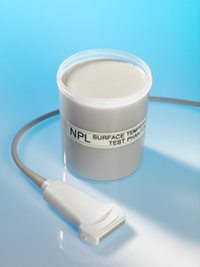Testing compliance of ultrasound transducers
The surface temperature test phantom is used to test compliance with the limits of ultrasound transducer surface temperature specified in IEC 60601-2-37 Ed 2.
The phantom is based on an agar-based tissue-mimicking material (TMM), prepared according to the recipe given in IEC 60601-2-37 Ed 2. The material mimics the acoustic and thermal properties of soft tissues and contains scattering particles of different diameter to mimic B-mode appearance of soft tissues. It was originally developed as part of a European Framework project for ultrasound testing.

The phantom is supplied with silicone rubber skin-mimicking layers of a range of thicknesses.
The dimensions of our standard cylindrical phantom are approximately 11.0 cm +/- 0.5 cm diameter, 11.5 cm +/- 0.5 cm height.
Custom geometries and features can be tailored to suit customer requirements:
- Height, diameter and shape.
- Cavities to simulate the use with endocavitary probes. Shape, position and dimension of the cavities can be specified.
- Non-scattering gelatine based TMM which follows the recipe in IEC 62306.
Additional information about the phantom:
- All the materials are within the tolerances of the IEC 60601-2-37 Ed 2
- Agar-based TMM: Speed of sound approx. 1540 m/s, attenuation coefficient approx. 0.55 dB/cm/MHz.
- Gelatine-based TMM: Speed of sound approx. 1540 m/s, attenuation coefficient approx. 0.45 dB/cm/MHz
If required, NPL can measure the acoustic properties for the specific test object or custom made materials, with an uncertainty of 3-5% for attenuation and <1% for speed of sound. We can also measure the thermal properties, including thermal conductivity, diffusivity and volumetric heat capacity, with a quoted uncertainty of 10%.
Don’t see what you are looking for? Our diverse skill set enables us to provide bespoke solutions. Please contact us to discuss your requirements.
Contact us
Find out more about NPL's research ultrasound
Find out more about NPL's ultrasound services
Find you more about NPL's temperature services